#[ analysis ]
Explore tagged Tumblr posts
Text
Okay, buckle up cause we’re diving in a small analysis which is gonna be totally irrelevant for nonfans but I love their dynamic (and now I’m awake enough to put this in text format).
So, in this episode, Doof creates a helmet that allows him to control whoever’s wearing it. He spends most of the episode making Perry do stupid things like push him around in a grocery cart, holding the phone for him on a call, slap himself, even making him pick up gum from the sidewalk and almost eat it (psychological torture right there, cause, gross). Things happen, Perry defeats him, Doof gets his hands in a bucket of glue and accidentally puts his hands on the records and the music stops.
Now, right before this song happens, Perry's leaving- evil’s been thwarted, his job is done. But then he hears the teens booing Doof, sees Vanessa mortified by him, and Perry grimaces and has an inner fight about what to do.
Usually, he leaves Doof to face the consequences of his own actions; he’s had no problem with leaving him stranded on the moon or letting stuff blow up on his face (literal and figuratively). Hell, the man has been tormenting him the whole day, he could very well leave him there. But Perry’s been hearing this man’s backstories for months (if not years) now, tales about his shitty childhood, his troubled youth, knows about how many times people have been cruel to him, or felt embarrassed to be linked to him, or simply weren’t emphatic/understanding towards him.
And yeah, Perry is a good guy (and that’s a big part of why he comes back), but also, he’s heard about this kind of scenario as a backstory multiple times, and it's happening in front of him now and he can do something about it. In a no-one-stood-up-for-you-back-then-but-now-I-will kind of fashion. Like, this hurt you in the past in such a scarring way you carry til today, but this time, it won't.
Also, because he knows Doof isn't inherently evil. He is a kind and traumatised person that chooses to heal his trauma in an evil manner (a no-no, but still, not a cruel villian).
In conclusion, (I personally think) this is such an important moment in the development of their relationship; it showcases the empathy, understanding and trust that’s started to grow between them. It could very well be the first time someone stood up for Doof. Regardless, it’s a lovely (and fun) scene, and one of my favourites in the whole show.
Also, to the animator that briefly drew Doof's eyes full of tears for a few frames before Perry got down to help him: watch you back.
I can't get over that Perry could easily just humiliate him in front of the crowd, but instead, he help him
Also the fact that Perry can only control Doof's arms and legs. Doofenschmirtz freestyled the whole song.
It's a bop
#no one is ever going to read this but anyway#if you do: thank you for coming to my ted talk#overanalysing cartoons is my passion#i've rambled about this to my bf last december so this is almost copy paste sdcjsddsv#i just love love love than scene#pnf#analysis#me blabs#gonna keep the other post but edit the tags#perry#doof
103K notes
·
View notes
Text
(yap incoming 💥💥💥)
I don't think we as a fandom talk enough about how both Kim AND Harry both had dreams of working in fields related to the Pale as children and how that interest carried on through both their lives.


As stated, Kim wanted to become an aerostatic pilot before becoming an RCM officer. Aerostatics were specifically designed to traverse the Pale, and in game Kim wears an aerostatic pilot jacket, despite not being a pilot.
On the merch website, (which, would not recommend supporting, but I'm putting this in as a little tidbit anyways-) we can see the actual stats + description for Kim's jacket.

It's clear that Kim still holds onto this dream and admires the pilots and the revolutionary brigade. He's also a huge torque dork, so I think it's safe to assume he's carried the fascination with aerostatics and machinery well into his adulthood. (also, Airman Kitsuragi.... I'm going to burst into tears. I'm so serious)
Now, as for Harry, I don't have that much info on. HOWEVER,

So, entroponetics is the study of the Pale. At some point when Harry was a child, before becoming a gym teacher, Harry wanted to be a Pale scientist.
(also, writing poetry is a tactic used before traversing the Pale to keep a stable mind. AKA: Volta do Mar.)
And just like Kim, that interest carried on as an adult.
NOW. Okay stay with me. I've just been thinking of the possibility of Kim and Harry meeting, except Kim is an aerostatics pilot, and Harry is a entroponologist. I have no idea if this is an original idea or if this is even coherent but. There are so many worms in my brain
#i really want to write a fic about this#would yall fw that...#theres probably plenty of reasons why they didnt follow these dreams but#let me have this anyways#text post#analysis#disco elysium game#disco elysium#harrykim#kimharry#harry du bois#kim kitsuragi
102 notes
·
View notes
Text
How Hannibal Loves vs. How Will Loves
Where one is nourished, the other aches.
Hannibal’s love for Will, when not threatened by the loss of control, is something delicate, brutal in its delicacy, yes, but still tender. He holds Will as one holds a thing of rare beauty, a treasure to be admired, adorned, sometimes with the gentle violence of his own scars. Will is not simply a man to Hannibal. He is art, the most beautiful among all beautiful things, something to be looked at, something precious. Will can wound him, shatter him, break him beyond recognition, and still, Hannibal cannot bring himself to hate him. He cannot even be truly angry.

In another life, in another world, one without blood and hunger, Hannibal would watch Will as he sleeps, or as he does something mundane, with quiet reverence. The sight of him would be nourishment, a sweetness that satiates the soul as milk satiates a newborn. Love, to Hannibal, is something to be savored, something to be held still in time and admired forever.
But Will’s love for Hannibal is something else entirely. If Hannibal’s love is milk, Will’s is liquor: inebriating, intoxicating, draining. It pulls at his sanity, leaves him starved, hollow. Hannibal is an endless well of violent delights, and Will drinks deeply, knowing that no matter how much he takes, it will never be enough. His heart is a vast and cavernous thing, like the womb of the universe, an emptiness that only expands the more it is filled. And so, love for Will is an ache, a hunger that cannot be satisfied. In another life, a life untouched by survival, Will would hold Hannibal too tightly, would press himself against him as if to dissolve into his very bones. Are you real? he would ask, over and over again. And if you are, let me live inside your ribcage.

And so, in the end, Hannibal would crave to die looking at Will, surrendering himself into that final, peaceful oblivion with the last sight of his ultimate beauty. And Will would crave to die in Hannibal’s arms, cradled by the only thing he has ever longed to belong to.
#musings#hannibal lecter#hannigram#nbc hannibal#will graham#meta#hannibal analysis#hannibal meta#analysis#essay
116 notes
·
View notes
Note
i think the saddest part of sailor moon, other than them dying over and over, is usagi and naru's friendship fizzling out by the end of the series
At the very least Stars confirms that Usagi and Naru still hang out occasionally!
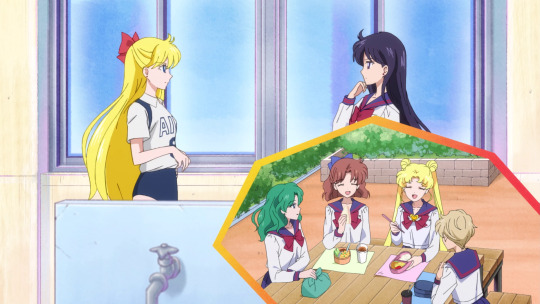
But yeah, it is sad that they grew apart. I also think it's very realistic. In many ways Sailor Moon is Usagi's coming of age story, and I think everyone above a certain age can relate to what happened to Usagi and Naru.
A lot of friendships do just do fizzle out. There's no big blowout, you still care about and think fondly of each other, but you've just drifted apart. Especially when you're a teenager, you go through so many changes. You make new friends, develop your own beliefs, maybe even move far away for college. Unless you're really really committed to maintaining a friendship, it's very easy for you to slowly drift apart and suddenly you haven't spoken to your childhood best friend in years.
I think Naru and Usagi will always cherish each other and as adults they probably talk and hang out every now and then (I can absolutely see Neo-Queen Serenity sneaking out for some normal girl time with Naru), but yeah, they're just not best friends anymore. And it's sad because we can all relate to it, but that's life.
#asks#sailor-lapis-lazuli#sailor moon#bishoujo senshi sailor moon#usagi tsukino#naru osaka#my analysis#analysis
84 notes
·
View notes
Text
True true
The two best reasons to ship anything are:
1.Incredible, deep and detailed narrative themes. The parallels that seem to hit just right, the narrative foils that they can be to each other, the intricate dynamic that's both extremely complex and easily understood. The juxtaposition between something that's harsh and undoubtedly toxic, with the softer undertones, the parts where you read in-between the lines and find a mutual feeling of loneliness from both parts, their intrinsic understanding of each other comes from the mere fact that they're each others mirrored reflections and shadows. In the end both sides will be together forever, and you as an audience can clearly see their tragedy laid out before in a path that blurs pure anguish and tender romance
2.It would be so fucking funny
17K notes
·
View notes
Text
I think I’ve said this before but Colin saying this line is so important because Penelope became his family as soon as they confessed their feelings for each other.
He knew his love for her was enduring and he could forgive Penelope. Because she was his family. He went through with the wedding and didn’t leave with the Whistledown blackmail because Penelope is his family.
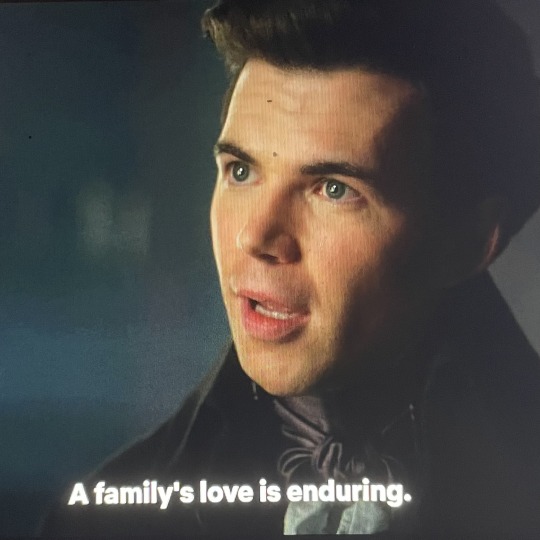
80 notes
·
View notes
Text
I had someone try to argue with me when I said that I think Bulma is a powerful character in Dragon Ball. They tried to argue and say she’s not a fighter, has weak chi, etc. so therefore she’s not powerful. And I was just thinking; are they not aware that power comes in many different forms?
Power isn’t just based by one’s strength, it can also be determined by the person’s intelligence/knowledge, mastery in certain skills, influence, wealth, social status/ranking, connections, position in politics, etc. and Bulma has many of these characteristics:
Bulma is INFLUENTIAL
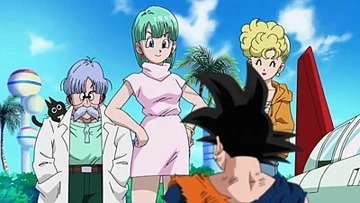
She is apart of a very influential family, the Capsule Corporation family! She’s the heiress of her father’s business, a business that creates a device that can shrink any object into small capsules. A device we see EVERYONE in the series use.
Not to mention her own existence influencing the story. If it wasn’t for her, we wouldn’t have Dragon Ball. She’s the one who built the dragon radar, she’s the one who found Goku and convinced him to join her on her adventure. Without her, Goku wouldn’t have left his house and met characters like Roshi, Krillin and his own wife, Chichi.
And of course, her influence on Vegeta. Bulma played a big part in Vegeta’s character development in DBZ, with him starting as a villainous irredeemable planet destroyer, and turning him into a hero/protector of earth and a loving husband/father. She took one good look at him, thought “I can fix him” AND DID. Her influence and even love for him made him a better person.

I can go on and on about how big of a role Bulma plays in Vegeta’s arc but I assume yall already know the story. 
Bulma is RICH
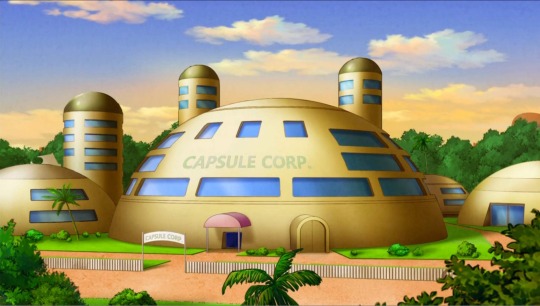
First off, look how freaking huge her house is! Capsule Corp is a multi milllion (possibly billion) dollar company. 
She’s so rich she has used her own money to fulfill her friends wishes that it got Shenron himself sweating. When promised prize money for everyone if they win the Tournament of Power, it was Bulma that provided the cash to anyone who wants it.
For her birthday party she took everyone her own cruise ship and hosted a Bingo game where the prizes consisted of: a brand new car, a jet, a giant diamond and a literal castle.

AND THOSE WERE JUST 2ND AND 3RD PLACE PRIZES!!!
Bulma has CONNECTIONS
She has frequent lunches with Whis who’s a literal Angel, made Beerus the God of Destruction her FREE babysitter and she’s close friends with Jaco the Galactic Patrolmen thanks to her sister, Tights.
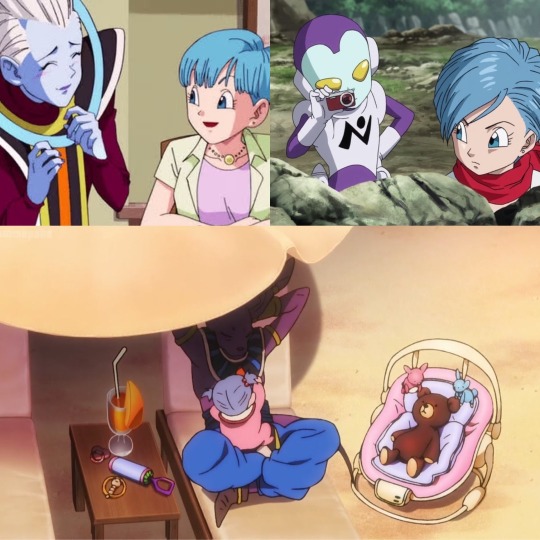
And not to mention the that she’s married to the Vegeta the Saiyan Prince, giving her a royal status, and is also childhood friends with Goku, another Saiyan. And her two children are also Half Saiyans!
Bulma is SMART
I’m just going to go over a list of things she’s invented/done throughout the series:
- The Dragon Radar and the Super Dragon Radar
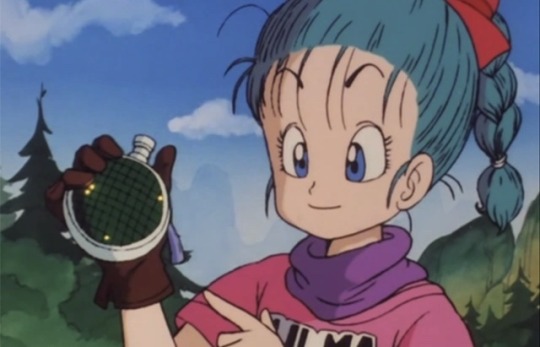
- A device that can make herself shrink and grow at her own will
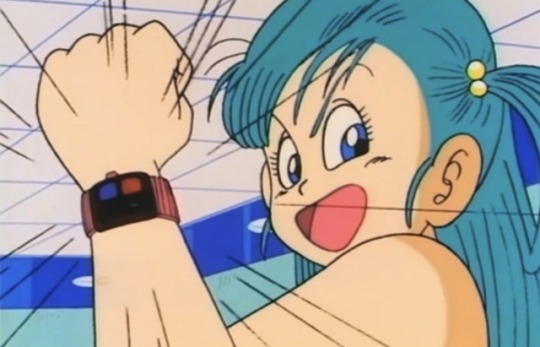
- She fixed Radtiz’s scouter, and even rewired it to be in a non alien language so she can properly read it
- Helped her dad rebuild the Namekien space ship that got her, Krillin and Gohan to Namek
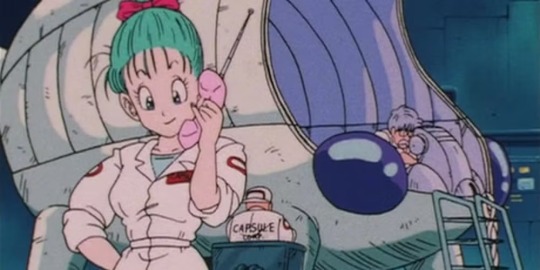
- An translator for Ginyu when he was trapped in a Namekian frog body (an animal that she did not know the biology of mind you)
- Helped her dad fix Android 16’s damages
- Saiyan armor, she was able to find a way to perfectly duplicate the material that Saiyans/the Frieza force use. Reminder that all armor Vegeta wears from Android saga and onward was made by her.
- A freaking Time Machine!! (Yes I know that was her future self who built it but it still says so much as to what Bulma is capable of creating)
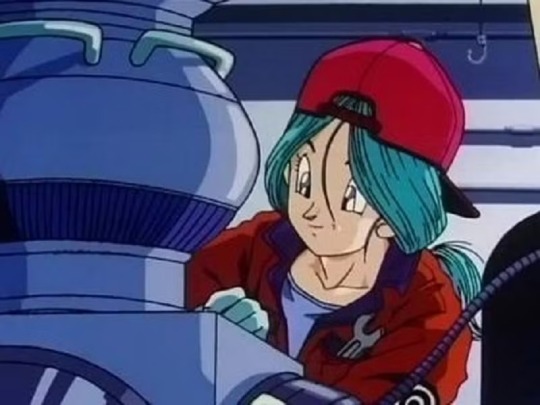
In conclusion, Bulma may not be a fighter like the others, but she has so many other qualities that make her powerful. She’s strong willed character, a helpful ally to Goku and friends, and an important member of the team thanks to her influence, connections, wealth and intelligence.
Bulma is POWERFUL because of who she is and what she does!
#fabtrash analysis#analysis#dragon ball#dragon ball z#dragon ball z Kai#dragon ball Daima#dragon ball super#dragon ball gt#dbz#dbs#dbgt#dbzkai#db daima#bulma#bulma briefs#dbz bulma#son Goku#vegeta#Beerus#who’s#jaco the galactic patrolman
44 notes
·
View notes
Text
Thinking about how even as early as 1x03 you can see the profound, fundamental differences between Soren and Claudia. Soren, who is ready to kill Runaan quickly because it’s the just/fair/right thing to do. Claudia, who is coming in and saying “no, actually we can use him for other things,” which leads to him being imprisoned/tortured/etc. Soren seeing elves as people versus Claudia seeing them as parts.
#I thought of this last week when I watched the episode#but I watched it again today and#OOF#Soren#Claudia#the dragon prince#tdp#analysis#oh tragic siblings how I adore you#personal#also#something something connecting to s2 when he’s like ‘killing a sleeping elf just doesn’t seem#sporting’
69 notes
·
View notes
Text
By the way. This is WHAT Superman perceive with his super senses. The very connections we make with each other. ALL of them. This is how he see us ALL the time. This is why, in All Star Superman, when Lex Luthor gained Superman's powers and finally obtained super senses, he broke down crying.
does anyone wanna hold hands until we feel a little braver
#analysis#superman#dc comics#all star superman#grant morrison#And this is the reason why the very concept of an “Evil Superman” is so fucking stupid.
283K notes
·
View notes
Text
this is a public service announcement to all revali fans: i invite you to join my campaign for the belief that mipha and revali are like, besties. there is no textual evidence to support this however i would like to dedicate the rest of this post to basically form a manifesto for this dynamic.
first it's important to acknowledge that botw and all champion related materials are kind of underbaked and don't elaborate on possibly any idea related to the champions enough to create Analyzable Depth, so when talking about these characters there's always an element of identifying either potential/setup for these characters and kind of trying to extend this. engaging with these characters kind of inherently means doing, in at least some part, the job of the writer and low key Making Shit Up. i acknowledge this and also embrace it and i suggest you do too.
so, mipha and revali: they are low key parallels, or at least play parallel roles to each other. the champions could be 'divided' into whether they relate more to zelda or link, and coincidentally link gets the boys and zelda gets the girls. daruk and urbosa are the older figures who take on a low key parental role to link and zelda respectively. daruk hangs out with link and gets him to loosen up a bit (source: his dlc diary) and urbosa is the one who cares for zelda and understands her deal the most (source: every single time urbosa is on screen). revali and mipha are, then, the peer character meant to 'challenge' link and zelda respectively.
revali challenges link's status as 'the chosen one', whether he really deserves this title and status etc by being the only champion with no inherent authority who had to work his ass off for any status he does have. mipha challenges zelda's role as a princess, by being also a princess with special powers who's practically perfect at everything zelda sucks at (being good at her power, getting along with link, having a loving family, having her people have complete faith in her, being mourned extensively after her death etc). revali and mipha further foil each other: revali is the most Outraged by the entire situation, whereas mipha is the most complacent. revali bases a lot of his beliefs about the situation largely on misunderstanding and projection, whereas mipha possibly has the most understanding about everything (about her entire role in this, about how special princess powers work, about link and generally the people involved). having these two characters interact and like, talk about things is inherently an interesting concept because of this.
furthermore, i believe they could bring out sides in each other that are largely unseen in most contexts. mipha is generally quite passive and quiet, despite having the most understanding she doesn't proactively voice it nor tries to actively 'enlighten' anyone. the one time she does try the apocalypse happens and even then she isn't like 'ok we are on borrowed time zelda lets debrief u need to unlock ur powers stat' shes just kind of like oh ok. guess the Very Important Conversation That Could Solve Everything has to wait. revali, on the other hand, doesn't shut the fuck up, and never even considers that he's wrong or working off of wrong premises. despite this, both of them have sides to them that are not like this: revali acts like a pompous asshole, but from his dlc scene and journal we can infer he has a bunch of underlying insecurities and also does Genuinely Care. and mipha, again from her dlc scene, has some older sister snark that comes out when she interacts with sidon, she's actually willing to be proactive with him and not overly coddle him.
with mipha's whole thing as the understander i think she'd be able to catch onto revali's shit almost immediately and see through his facade. at the same time she's not the type of character to actively try and fix him, i actually think she'd express her understanding in a kind of cheeky, snarky way, 'match his energy' so to speak, because she knows that's something that would actually ruffle some feathers (heh) and get revali out of his comfort zone. for revali, on the other hand, i think it'd be a very disarming experience to be actually called on his bullshit by a peer who seems to actually get him and not buy his whole pompous asshole thing. i also think he'd kind of project his own feelings of being upstaged by Some Guy onto mipha, an actually competent princess who also has to step back just because she's from the wrong royal family. their kind of opposite personalities and perspectives are able to complement each other, coming together to a perfect equilibrium of 'yes there are things that are very unfair about this but there are reasons for the way things are and we kind of have to accept that'. it is kind of beneficial for both of them to hear about/engage with the others' perspective.
a quick aside bc i know a bunch of you are revalink fans: the dynamic of revali and link one sided rivalry meanwhile mipha is great friends with both of them is really funny, and also opens a door for revali to develop a better understanding of link and give him a chance. i don't go here i am a miphzel girlie however this is something to consider.
now: would they actually like each other? the answer for mipha is simple because like, i think she just kind of likes everyone. for revali it's a little more interesting and i think it's important to bring up the way he views zelda: he talks about it in his diary, but basically there is an element of him looking down on her there's also a distinct sense of pity ("It's not that I dislike the Princess. She tries her hardest. It's simply not good enough"). there are a few reasons for why there's a pity present where it is not for link, part of it is pretty much explicitly stated with how he views zelda as earnest meanwhile link as emotionless. i, being me, read botw as a very deliberately gendered story and will assert that in my reading, part of the reason why he has a distinct rivalry with link and does not with zelda is because link is also male.
part of it is because the roles of the hero and the princess are inherently gendered, and revali wants the role of the hero, the role he thinks is being taken away from him. he understands the role of the hero as the main fighter, which is what he wants to be, and he doesn't have the same interest in whatever role the princess plays in defeating ganon. part of it is the fact that revali is a teenage boy, and link is also a teenage boy. the way he provokes him and tries to enter an adversarial relationship with him reads to me as like, the kind of bickering you do with specifically a peer you view as a challenger, in this case the role they're both aiming for is the 'knight', in the case of link literally, and in the case of revali more symbolically, as the top archer and 'protector' of his village.
now this is where we veer off into the 'Making Shit Up' part of analyzing botw champions, namely there's a lot of interpretations one could come up with using the implications of this aspect of his character, to name a few: he potentially does still hold a kind of respect for the authority of royalty, namely princesses; he is a feminist; my personal favorite: he has some aspects of toxic masculinity making him pursue rivalry with other men, while not viewing women as rivals in the same way. either way, one think is clear: he doesn't react to princesses with the same antagonism he does to knights.
so, what we have here: he values 1. competence 2. sincerity 3. people who cannot rival him for his status or any status he wants. mipha checks all three.
furthermore, now that we have established that revali is a kind of 'knight', and mipha is a princess, and they both foil link and zelda respectively, they are, like link and zelda, a knight and princess pair, ergo their potential friendship is in itself a foil to link and zelda. with link and zelda, we have a very complacent, passive knight and a princess with a propensity for projection who is very vocally not happy with the situation. and with revali and mipha, we have a knight with a propensity for projection who is very vocally not happy with the situation and a very complacent, passive princess. the first pair's dynamic leads to conflict between the two of them, and who survive despite their incompetence. the second pair's dynamic, in my pitch, leads to closeness and friendship, and who die despite their competence. Are You Seeing This.
so yeah. i have mostly focused on their synergy and narrative foilage instead of the specifics of their potential dynamic, although i do have opinions on that too, however i have omitted those largely bc of what i have discussed in paragraph one. this is not a pitch for you to subscribe to my personal interpretations of these character's personalities, it is a pitch for you to make them interact. more.
TL;DR: the potential dynamic between revali and mipha is scrumptious because they're literally foils to each other and to link and zelda and we should all be exploring it more
#loz#botw#legend of zelda#breath of the wild#my hot takes#mipha#revali#link#zelda#meta#analysis#revalink
58 notes
·
View notes
Text
It's the way Caleb has to sacrifice his body to be the perfectly engineered weapon so the big bad boss will be distracted from hunting you down, but in the process he lost his ability to feel normal emotions and became more ruthless and possessive instead, and now you have conflicted feelings about him BUT HE DID ALL OF THIS FOR YOU. He has to make you hate him to save you. He has to make you forget him to be happy.
It's an easier concept to accept when the morally grey guy stops at killing everyone for you. But what about when he has to kill parts of himself to sustain you? When he's not selfless enough to leave you, so now you're left with the broken parts and you have to decide whether you can still love him? Is it still love if he's barely the person you knew? Can you leave him when you know you're the reason he's changed? Can you live with him and the guilt? Who will you be after all is said and done?
#this is my writer brain whirring#xela talks#love and deepspace#caleb#lads#lads caleb#caleb meta#love and deepspace meta#lnds#meta#analysis
81 notes
·
View notes
Text
Thoughts and Theories on Pokemon Legends Z-A
With Pokemon Legends Z-A being very different from Legends Arceus, I wanted to figure out what all the differences we know so far are, and what similarities there were to connect the two as "Legends" games.
So here are all the big similarities and differences with a pinch of speculation and a dash of slight TeraLeak info!
Differences between PLA and PLZA:
Pokemon may no longer be able to kill you.
It’s a modern world- you can actually fight trainers, and many different kinds! With this extra source of Exp and gameplay, will there be less focus on mass catching and research tasks?
To build on this, the “boss fights” will likely no longer be noble Pokemon, or not even singular Pokemon at all. Instead, they will likely take the form of trainer battles. Not Gym Leaders, as that would undermine Clemont’s job. Instead, they may be major city figures who use Megas, whom you must recruit to give you access in developing the rest of the city.
Less focus on crafting, maybe more focus on money and business-building? Dex completion will likely still contribute to earning funds in some way, though.
The cast can’t be ancestors anymore- instead we get timeskip designs to show off. Most likely the residents of Lumiose. Clemont, Bonnie, Emma. Maybe other Kalos residents like Xerosic, Sycamore, Sina, and Dexio. Hopefully even Calem and Serena!
Maybe the Fallers subplot will continue, maybe not. Maybe depressed Emmet will be here.
While regional variants may still be around, there will likely be less focus on them thanks to the return of Megas.
To help us estimate how many new Megas there may be, there were 28 Megas in XY. 18 Megas in ORAS. 18 Alolan Forms. 20 Galarian Forms. 16 Hisuian Forms. 4 Paldean Forms. 22 Paradoxes (Counting Koraidon & Miraidon)
With less focus on the wilderness, Ride Pokemon may have a reduced role (Cabs and Gogoat could return) and parkour combined with Rotom Phone upgrades will likely further replace Ride Pokemon.
With Megas returning, this could mean the potential return of abilities and held items. This is not a guarantee, though. Megas have appeared in many other games that lacked either abilities or held Mega Stones, including Let’s Go, Pokemon Go, Mystery Dungeon DX, Shuffle, Smash Bros, MastersEX, and more.
Most notably, you are bound to one city instead of a whole region.
The urban environment means we could get complex new indoor areas for the first time since USUM in 2017 (If you don’t count Let’s Go and BDSP as remakes)
So, what IS a Legends game?
Similarities between PLA and PLZA:
You return to an older Pokemon region at a different point in time compared to the original games (Past/Future). As opposed to remakes, which re-tell the events of the original games.
The starters are a mixed assortment of previous starters (likely) with new forms for their final stages.
You are not taking the Pokemon League challenge in any way. Instead, you are building up a civilisation (Jubilife Village/Lumiose City)
Heavy theming on the balance between humanity and nature. PLA is about urbanizing and colonizing a wilderness, and PLZA is about re-introducing nature to a developed city.
“Drive by” catching is a thing, where you can throw Pokeballs at Pokemon without engaging in a battle screen to fight them.
The battles themselves diverge from the typical turn-based format of the mainline games.
While you are not able to explore the whole region (Floaroma, Eterna, Canalave, and its islands aren’t in PLA), what you can explore is divided into five different roamable areas, unlocked as you progress through the story.
A marketable appeal in seeing a region and its characters in a different time (Ancestors in PLA and timeskip designs in PLZA)
A marketable appeal in introducing new forms for existing Pokemon and (likely) even a small handful of new Pokemon!
Sidequests given to you by townsfolk help flesh out the world and its people.
No version exclusives, and story focus on a Trio master legendary/mythical which didn’t have its own game before.
#pokemon#pokemon legends#pokemon legends arceus#pokemon legends za#legends za#pokemon legends z-a#theory#q speaks#analysis#speculation
47 notes
·
View notes
Text
catradora and the perfect victim complex
(i literally fucking think about this all the time so this just gonna be a rant lol)
i really, truly think that people in general don’t put the effort into understanding characters who are imperfect victims. for them, it destroys the appeal of victimhood. victimhood (especially when the victims in question are girls, women, femme presenting people, etc.) needs to be beautiful and tragic. think characters like ophelia, snow white, odette, juliet, the lisbon sisters. otherwise, their victimhood is no longer attractive.
catra is an imperfect victim. shadow weaver’s abuse did not make her soft, weak, timid, or fragile. it made her bitter, angry, and resentful.
i once saw a catra anti saying some bullshit about how they might’ve liked catra more if the writers had spent more screen time showing shadow weaver abusing her, specifically her when she was a kid.
this person wanted to see catra’s pain as beautiful. they wanted to see her ONLY as a child to be pitied, the little kid who cowered in fear instead of fighting back, and not have to acknowledge catra’s more complicated character traits.
i also think this is why these same people often talk like they love adora, like “adora deserves better than catra” and all that shit. adora (to them) is easier to see as a perfect victim. shadow weaver’s abuse made her obedient and self-sacrificing. it made her put others before herself, even to the point of fucking death. adora is selfless and brave. she’s so determined to be a perfect hero, to protect people, to care for people, to love people. these traits are easier to romanticize. it makes her seem beautiful.
if you ask me, this is a really fucked up way of viewing adora. i don’t love adora bc she’s a “perfect victim”, i love adora bc she, like catra, is also flawed. adora’s determination to be perfect leads her to abandoning catra. her inability to empathize with catra leads her to behaving the way she did in taking control. adora isn’t fucking perfect.
(for context i do also think that catra was in the wrong in that episode too, but i feel like we don’t talk enough about how badly adora was handling the situation. like seriously girl catra is here basically telling her “i don’t trust you bc i don’t believe that you could ever love me bc i’m inherently fucked up and unlovable” and adora’s immediate reaction is to blow up at her. it makes sense given what adora has just done for her, but it’s another example of adora being incapable of empathizing with catra. also calling her a stubborn brat? yeah uh that wasn’t funny adora, especially not with the ways that shadow weaver talked about catra.)
but i love that adora is flawed, and i love that catra is flawed. they’re not archetypes. no real person experiences abuse like they did and comes out perfect. catra’s intense fear of abandonment and resentment issues are a very fucking real response to the way she was traumatized. regardless of how ugly it is.
at the end of the day, i think that people can’t wrap their brains around this concept and refuse to empathize with imperfect victims bc they don’t want to admit that they, too, are imperfect victims. the perfect victim isn’t real. it’s a fucking myth.
in real life, people are messy and complicated, like catra and adora. it’s why i love them :)
ugh i could literally go on about this FOREVER i swear.
#catradora#spop#she-ra#catra#adora#catradora brainrot#analysis#perfect victims#she ra and the princesses of power#the nuance in this show is so so fucking good#i love these girls so much#they are everything to me
38 notes
·
View notes
Text
Hannibal: Love and Death making love to each other.
How devastating it is to love something that death can touch.
To love is to be brave enough to lose. To love is, inevitably, to lose. Everything ends, everyone dies. This is the inescapable truth that love forces us to face. Loving is the ultimate act of courage, of surrender, of opening oneself to ruin. When someone we love is gone, they do not just disappear; they leave behind an absence that resounds louder than their presence ever did. Their death is silence, it is the empty space they once filled, the void where their voice should be, the ache where their touch used to linger. To love is to carve a place for loss inside yourself before it ever arrives.
Love and pain are twin flames, inseparable. We long for love, but it is always laced with the subconscious awareness that it will be taken from us. It is a paradox, a desperate attempt to grasp something that will never truly belong to us, an unfulfilled hunger that lingers in separated bodies, divided breaths. No matter how deep the connection, we remain separate, bound by the limits of our flesh. We make love to dissolve those boundaries, to merge, to trick ourselves into believing we can escape the inevitable. But we know the truth: we will never fully become one. And so, love aches.
It is not difficult to understand why Hannibal, someone who exists in complete dominion over his world, would rather destroy what he loves than allow it to be taken from him. Love is a force he cannot control, a force he never chose, yet it claimed him before he could resist. It took his sister, his parents, his innocence. It left behind a hunger so deep it became his nature, an emptiness he could never satisfy. Love, to him, is a death sentence. And so, to survive it, he refuses it. Until Will.
Will, who arrives like a force of nature, like love itself: unbidden, uncompromising, demanding. Will, who awakens the hunger, the fear, the unbearable knowledge that Hannibal has something to lose again. And so, he does the only thing left to do: he refuses to be at love’s mercy. He chooses death on his own terms. If loss is inevitable, he will not wait for it. He will not be its victim. I will take this from myself by my will, not Yours. I will lose when I choose to, not when You decide it is time.

I was worried you were dead.
Hannibal does not want Will to die, but he is constantly pushing him toward the edge of death, tempting it, teasing it. But the reason is simple. It is the same impulse as the man who believes himself unworthy of love, who, instead of rising to meet it, sabotages it at every turn, hoping to make the beloved leave him first. A preemptive wound. A controlled loss.
We convince ourselves that pain is easier to bear when we administer it in measured doses, that if we are the ones wielding the knife, it will cut less deeply. Hannibal is no different. He knows, has always known, that loving Will means losing him. And so, he moves to end it before it can end him. He flirts with Will’s destruction as a way to steel himself against the inevitable. If Will must be taken from him, let it be on his own terms. If this love is doomed, let him set fire to it with his own hands.
It is not cruelty. It is fear. The same fear that has governed him all his life: the fear of loss, of devastation, of the hollow hunger that follows. He edges Will toward death not because he desires it, but because he cannot bear to wait for it. Get this over with, he thinks. Let me suffer now, while I am still braced for it, before it catches me unguarded.
#musings#hannibal lecter#hannigram#nbc hannibal#will graham#meta#hannibal analysis#hannibal meta#analysis#essay
56 notes
·
View notes
Text
A switch of cards laid out by destiny where Joke goes from having the Ace (also known as the death card - thank you @fanshipper1412 for explaining that to me, it was a fantastic revelation!), to helping Hoy have a better hand by taking his Joker card and giving him his own 4 card. At the end, Joke is left with two cards - The Ace beside Joker. Death beside Joke. So, Joke switches his and Hoy's destiny. First, at that poker table where he switches their cards and next at the pier where he throws away the bomb detonator to save Hoy and sacrifices himself. But the Joker Card is also known as the Wild Card. And so it avades the Ace, it survives Death in a way only a wild card can.
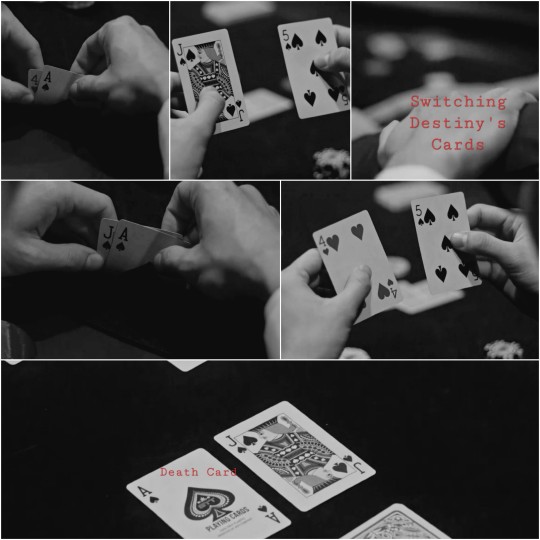
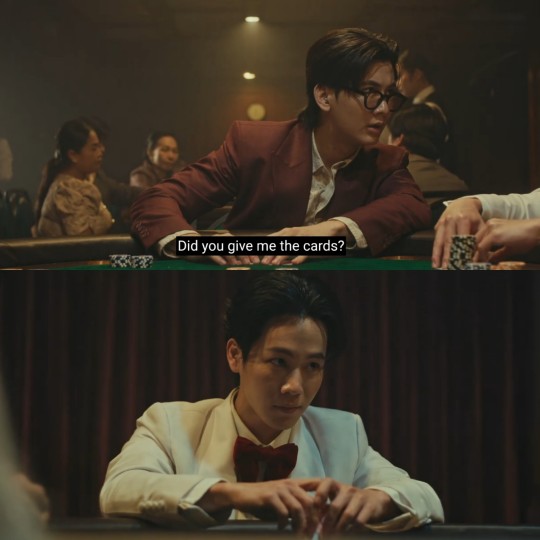
#jack and joke special episode spoilers#jack and joker special episode#jack & joker: u steal my heart!#jack and joker#hoy and joke#jackjoke#jokejack#thai bl#thai drama#asianlgbtqdramas#yinwar#fanfictionroxs writes#analysis#meta
36 notes
·
View notes